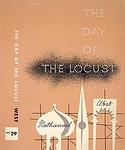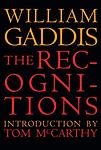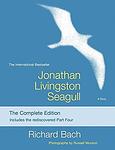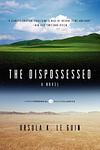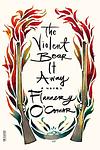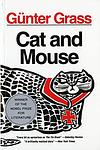The Greatest American, German "Allegorical" Books of All Time
Click to learn how this list is calculated.
This list represents a comprehensive and trusted collection of the greatest books. Developed through a specialized algorithm, it brings together 305 'best of' book lists to form a definitive guide to the world's most acclaimed books. For those interested in how these books are chosen, additional details can be found on the rankings page.
Genres
Allegorical books are a genre of literature that use symbolic characters, events, and settings to convey a deeper meaning or message. These stories often have a moral or philosophical lesson that is meant to be interpreted by the reader. Allegories can be found in many different types of literature, including novels, short stories, and poetry. They are a powerful tool for exploring complex ideas and emotions, and can be used to comment on social, political, or religious issues. Overall, allegorical books are a thought-provoking and engaging genre that challenges readers to think critically and reflect on the world around them.
Countries
Date Range
Reading Statistics
Click the button below to see how many of these books you've read!
Download
If you're interested in downloading this list as a CSV file for use in a spreadsheet application, you can easily do so by clicking the button below. Please note that to ensure a manageable file size and faster download, the CSV will include details for only the first 500 books.
Download-
1. Adventures of Huckleberry Finn by Mark Twain
The novel follows the journey of a young boy named Huckleberry Finn and a runaway slave named Jim as they travel down the Mississippi River on a raft. Set in the American South before the Civil War, the story explores themes of friendship, freedom, and the hypocrisy of society. Through various adventures and encounters with a host of colorful characters, Huck grapples with his personal values, often clashing with the societal norms of the time.
The 24th Greatest Book of All Time -
2. Invisible Man by Ralph Ellison
The novel is a poignant exploration of a young African-American man's journey through life, where he grapples with issues of race, identity, and individuality in mid-20th-century America. The protagonist, who remains unnamed throughout the story, considers himself socially invisible due to his race. The narrative follows his experiences from the South to the North, from being a student to a worker, and his involvement in the Brotherhood, a political organization. The book is a profound critique of societal norms and racial prejudice, highlighting the protagonist's struggle to assert his identity in a world that refuses to see him.
The 28th Greatest Book of All Time -
3. The Magic Mountain by Thomas Mann
In this novel, the protagonist, a young, ordinary man, visits his cousin at a tuberculosis sanatorium in the Swiss Alps. Intending to stay for only a few weeks, he ends up remaining there for seven years, becoming a patient himself. The book explores his experiences and relationships with other patients and staff, delving into philosophical discussions on life, time, and the nature of disease. It also provides a vivid portrayal of the European society and intellectual life on the eve of World War I.
The 43rd Greatest Book of All Time -
4. The Scarlet Letter by Nathaniel Hawthorne
Set in 17th-century Puritan Boston, this novel tells the story of a woman who conceives a daughter through an affair and struggles to create a new life of repentance and dignity. She is forced to wear a scarlet "A" on her dress as a sign of her adultery while her lover, a revered local minister, remains unnamed and unpunished. Throughout the book, themes of sin, legalism, and guilt are explored.
The 58th Greatest Book of All Time -
5. The Tin Drum by Günter Grass
The novel tells the story of Oskar Matzerath, a boy who decides on his third birthday that he will stop growing and remain a three-year-old forever. Oskar is gifted with a tin drum by his mother, which he uses to express his emotions and thoughts. Living in Danzig during the rise of Nazi Germany, Oskar's refusal to grow is a form of protest against the adult world. The book is a blend of magical realism and historical fiction, providing a unique perspective on the horrors of World War II and the post-war era in Germany.
The 93rd Greatest Book of All Time -
6. One Flew Over the Cuckoo's Nest by Ken Kesey
Set in a psychiatric hospital in Oregon, the novel is narrated by a half-Native American patient known as Chief Bromden, who pretends to be deaf and mute. The story follows the arrival of a new patient, a boisterous, rebellious man who challenges the oppressive and dehumanizing system of the hospital, particularly the tyrannical Nurse Ratched. The book explores themes of individuality, rebellion, and the misuse of power, ultimately leading to a tragic conclusion.
The 98th Greatest Book of All Time -
7. Steppenwolf by Hermann Hesse
The novel presents a poignant exploration of a man's struggle with his dual nature. The protagonist, a middle-aged man, finds himself torn between his humanistic, intellectual tendencies and his more primitive, wolf-like instincts. As he navigates his way through the surreal and sometimes hallucinatory world, he encounters various characters who challenge his views and push him towards self-discovery and transformation. The narrative delves into themes of alienation, the subconscious mind, and the search for meaning in life.
The 147th Greatest Book of All Time -
8. Doctor Faustus by Thomas Mann
The novel is a reimagining of the Faust legend set in the context of the first half of the 20th century and the turmoil of Germany in that period. It tells the story of a composer who makes a pact with the devil, exchanging his soul for unlimited creative genius. The protagonist's life and work reflect the cultural and political journey of Germany leading up to World War II, providing a deep exploration of the individual's role in a society undergoing dramatic change. The novel is also a profound meditation on the nature of time, the art and the artist, and the destructiveness of human ambition.
The 153rd Greatest Book of All Time -
9. Gravity's Rainbow by Thomas Pynchon
Set during the end of World War II, the novel follows Tyrone Slothrop, a lieutenant in the U.S. Army, as he tries to uncover the truth behind a mysterious device, the "Schwarzgerät", that the Germans are using in their V-2 rockets. The narrative is complex and multi-layered, filled with a vast array of characters and subplots, all connected by various themes such as paranoia, technology, and the destructive nature of war. The book is known for its encyclopedic nature and its challenging, postmodernist style.
The 182nd Greatest Book of All Time -
10. Thus Spake Zarathustra by Friedrich Nietzsche
This philosophical novel explores the idea of the Übermensch, or "Overman," a superior human being who has achieved self-mastery and created personal meaning in life. The protagonist, Zarathustra, descends from his solitary life in the mountains to share his wisdom with humanity. Through a series of speeches and encounters, he challenges traditional beliefs about good, evil, truth, and religion, and advocates for the transcendence of man into a higher form of existence. The book is noted for its critique of morality, its poetic and often cryptic language, and its exploration of complex philosophical concepts.
The 282nd Greatest Book of All Time -
11. The Day of the Locust by Nathanael West
"The Day of the Locust" is a novel set in 1930s Hollywood, portraying the dark side of the American dream through the lives of its desperate characters. The protagonist, a young artist from the East Coast, finds himself disillusioned by the superficiality and decay of Hollywood society, which is filled with failed actors, charlatans, and lost souls. The narrative culminates in a violent riot, symbolizing the destructive power of frustrated dreams and the harsh reality of the American dream.
The 354th Greatest Book of All Time -
12. The Crying of Lot 49 by Thomas Pynchon
The novel follows the journey of a woman who stumbles upon a centuries-old conflict between two mail distribution companies when she is appointed the executor of her ex-lover's will. As she delves deeper into the mystery, she begins to question her own sanity and the reality of the conspiracy itself. The story explores themes of communication, interpretation, and the struggle to find meaning in a chaotic world.
The 378th Greatest Book of All Time -
13. The Glass Bead Game by Hermann Hesse
Set in the 23rd century, the novel revolves around a highly intellectual game, the Glass Bead Game, which incorporates all fields of human and cosmic knowledge. The story follows the life of Joseph Knecht, a scholar who becomes a Magister Ludi (Master of the Game). The book explores his life and thoughts, including his relationships with others and his questioning of the values of his society. The narrative is a profound exploration of human life, knowledge, and spirituality.
The 450th Greatest Book of All Time -
14. Death in Venice by Thomas Mann
"Death in Venice" is a novella that explores the life of Gustav von Aschenbach, a famous writer in his early fifties who embarks on a journey to Venice after experiencing a creative block. In Venice, he becomes obsessed with a beautiful Polish boy named Tadzio, whom he sees at the hotel where he is staying. Aschenbach's fascination with Tadzio becomes a metaphor for his own internal struggle with his repressed passions and his need for aesthetic beauty. The story culminates in Aschenbach's death as a cholera epidemic sweeps through Venice. His demise symbolizes the destructive power of his unfulfilled longing and his ultimate surrender to his repressed desires.
The 460th Greatest Book of All Time -
15. Wise Blood by Flannery O'Connor
"Wise Blood" is a novel about a young man named Hazel Motes, who returns home to Tennessee after serving in World War II and finds his religious beliefs shaken. He becomes a street preacher, founding the Church Without Christ to preach his message of faithlessness. The book explores themes of redemption, faith, and the struggle between belief and atheism as Hazel interacts with a variety of eccentric characters and faces his own internal battles.
The 486th Greatest Book of All Time -
16. The Recognitions by William Gaddis
The novel is a complex and lengthy examination of authenticity and forgery. It tells the story of a young man who becomes a master forger of Old Masters paintings, while exploring themes of identity, religion, and art. As the plot unfolds, the protagonist grapples with his own authenticity in a world obsessed with appearances and material success. The narrative is interspersed with philosophical and religious discussions, making it a challenging yet thought-provoking read.
The 634th Greatest Book of All Time -
17. Miss Lonelyhearts by Nathanael West
This novel revolves around an advice columnist, who writes under the pseudonym "Miss Lonelyhearts", for a New York newspaper during the Great Depression. As he reads and responds to the desperate letters from the city's distressed and downtrodden, he becomes increasingly disillusioned and depressed, struggling with his own faith, identity, and the bleakness of the human condition. The protagonist's personal life also spirals out of control, entangling him in a series of complicated romantic relationships and leading to a tragic conclusion.
The 658th Greatest Book of All Time -
18. Mumbo Jumbo by Ishmael Reed
"Mumbo Jumbo" is a satirical and unconventional novel that explores the cultural and political landscape of 1920s America. The narrative centers around an ancient virus known as "Jes Grew" which is spreading rapidly, causing people to dance, feel joy and lose their inhibitions. The protagonist, an African-American detective, is tasked with finding the text that supposedly contains the cure for this "disease". The book uses this premise to critique Western civilization and its attempts to suppress African and other non-European cultures.
The 752nd Greatest Book of All Time -
19. Jonathan Livingston Seagull by Richard Bach
The book tells the story of Jonathan Livingston, a seagull who is bored with the daily squabbles over food and is seized by a passion for flight. He pushes himself, learning everything he can about flying, to the point of being ostracized from his flock. He becomes an extremely high flyer, and meets other gulls who have been ostracized for not conforming. The story is about self-perfection and self-sacrifice for the sake of a higher purpose, symbolizing the pursuit of perfection in some form.
The 778th Greatest Book of All Time -
20. The Dispossessed by Ursula K. Le Guin
The novel is a profound exploration of two vastly different societies on twin planets, Urras and Anarres. The protagonist is a brilliant physicist from Anarres, a planet with an anarchist society, who travels to Urras, a planet with a capitalist and authoritarian regime. The book explores his struggle to reconcile his anarchist beliefs with the stark realities of a different socio-political system. It's a thought-provoking investigation of human nature, power structures, and the idea of utopia.
The 870th Greatest Book of All Time -
21. Everything That Rises Must Converge by Flannery O'Connor
"Everything That Rises Must Converge" is a collection of nine short stories that explore themes of racial tension, family dynamics, and morality in the mid-20th century American South. The stories delve into the psyche of various characters, most of whom are grappling with the changing social and racial landscape of the time. The narratives often reveal the characters' inherent prejudices and their struggle to reconcile their beliefs with the evolving world around them.
The 1362nd Greatest Book of All Time -
22. The Violent Bear It Away by Flannery O'Connor
The novel revolves around a young boy, Francis Tarwater, raised by his religious fanatic great-uncle in the backwoods of the American South. After his uncle's death, he is torn between following his uncle's wish for him to become a prophet, and the allure of a more conventional life presented by his educated uncle, Rayber. The story is a deep exploration of religious extremism, the struggle between free will and destiny, and the power of prophecy.
The 1630th Greatest Book of All Time -
23. Demian by Hermann Hesse
The novel follows the life of a young man, Emil Sinclair, from childhood to adulthood, as he navigates the duality of his nature and the societal expectations of his time. He is influenced by a charismatic and intellectual peer, Max Demian, who introduces him to the concept of the world not as a dichotomy of good and evil, but as a unified whole. This leads Sinclair on a journey of self-discovery and spiritual enlightenment, exploring themes of identity, morality, and the subconscious. The narrative is heavily influenced by the philosophies of Carl Jung and the Gnostic tradition.
The 1635th Greatest Book of All Time -
24. The Resistible Rise of Arturo Ui by Bertolt Brecht
"The Resistible Rise of Arturo Ui" is a satirical play that uses the rise of a fictional 1930s Chicago mobster, Arturo Ui, to parallel the rise of Adolf Hitler in Nazi Germany. The narrative is a critique of those who allowed Hitler to come to power, emphasizing that his rise was indeed resistible. The play explores themes of power, corruption, manipulation, and the dangers of complacency, showcasing the destructive potential of unchecked ambition and the failure of society to prevent the ascent of dangerous individuals.
The 1725th Greatest Book of All Time -
25. Cat and Mouse by Günter Grass
"Cat and Mouse" is a novel that centers around a group of boys living in Danzig during World War II. The story is narrated by one of the boys, who recounts the life of his friend, whom they call "the great Mahlke", a boy with a large Adam's apple. Mahlke's attempts to prove himself a hero despite his physical oddity, his obsession with a sunken ship, and his eventual expulsion from school and enlistment in the war form the heart of the narrative. The novel explores themes of identity, guilt, memory, and the devastating impact of war on the individual and society.
The 1761st Greatest Book of All Time
Reading Statistics
Click the button below to see how many of these books you've read!
Download
If you're interested in downloading this list as a CSV file for use in a spreadsheet application, you can easily do so by clicking the button below. Please note that to ensure a manageable file size and faster download, the CSV will include details for only the first 500 books.
Download









